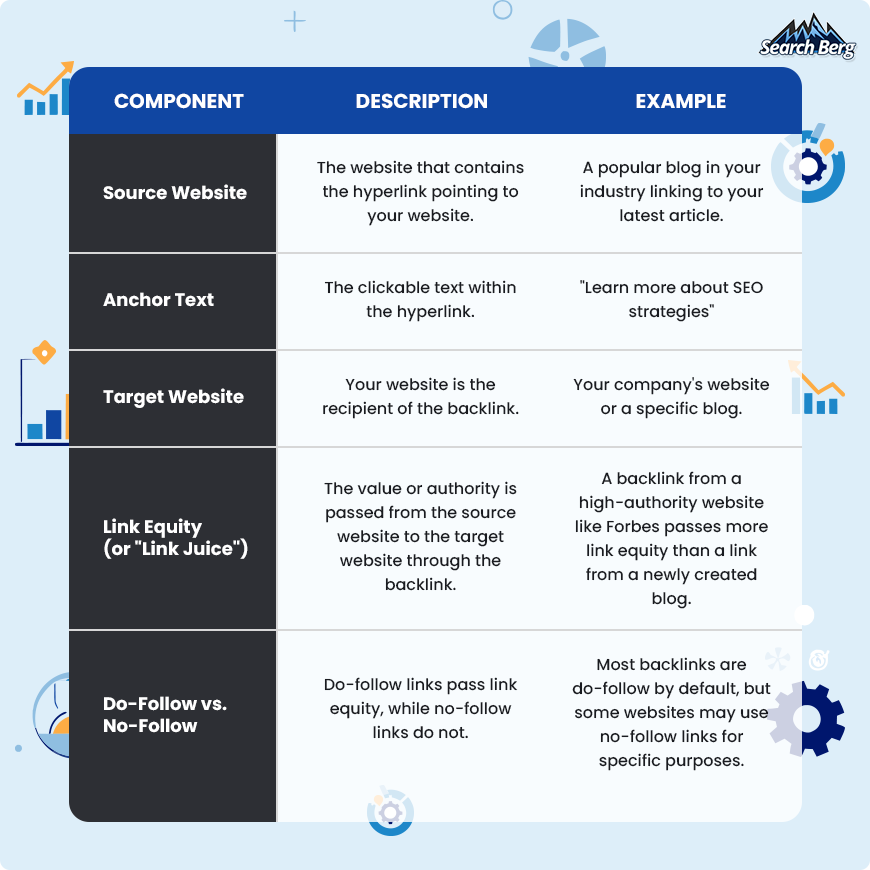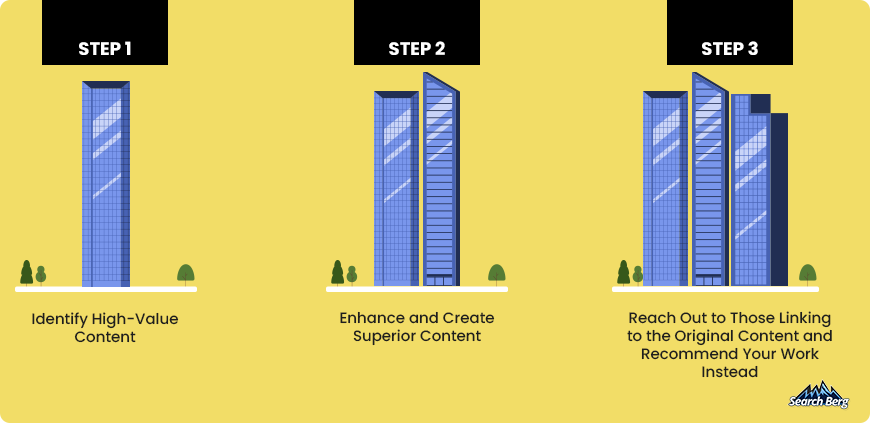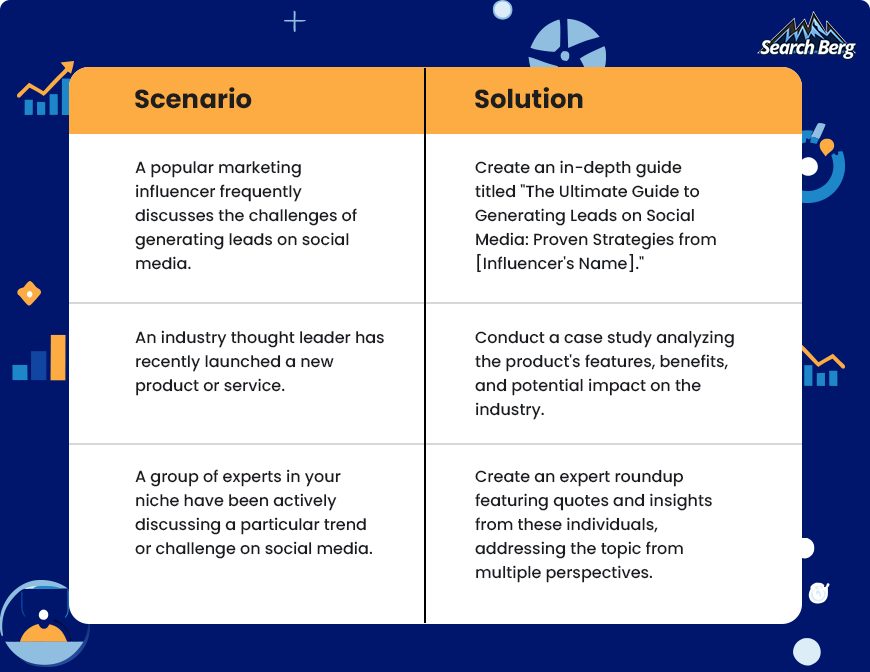How to Build Backlinks in SEO: 5 Tips for Strategic Link Building

Building a successful website isn’t just about having a pretty design and compelling content. It’s about visibility. If your target audience can’t find you amidst the digital noise, all your hard work is practically for nothing.
And let’s face it, Google’s algorithm isn’t exactly a walk in the park. It’s constantly evolving, demanding that websites earn their place at the top of search results.
The key? Backlinks. These digital endorsements act as votes of confidence, signaling to Google that your website is a trustworthy source of information.
But here’s the kicker: all backlinks aren’t created equal. You can’t just buy them in bulk or spam forums hoping for a quick fix. Strategic link building is a blend of relationship building, content creation, and technical know-how.
If you’re ready to ditch the obscurity and claim your spot in the digital limelight, this guide is your golden ticket. Join us as we explore proven link building techniques, arming you with the tools and knowledge you need to build a backlink profile that propels you to the top.
It’s time to ditch the guesswork and embrace a proven path to success: link building services. Are you in?
What Are Backlinks?
Before we break down the recipe for building backlinks, let’s first lay a solid foundation by understanding the very essence of a backlink.
Backlinks are incoming hyperlinks from one website to another. Think of them as digital votes of confidence, where one website essentially vouches for the credibility and relevance of another.
Search engines, particularly Google, interpret these backlinks as signals of trust and authority. The more high-quality backlinks a website possesses, the more likely it is to rank higher in search results.
Instead of accumulating a large number of links; the goal is to earn links from reputable, authoritative websites within your niche. These links carry more weight in the eyes of search engines and can significantly impact your website’s visibility and organic traffic.
Let’s break down the anatomy of a backlink:

Backlinks play a multifaceted role in boosting your website’s SEO performance:
- Improved Rankings: Search engines view backlinks as endorsements, indicating that your content is valuable and relevant. This can lead to higher rankings in search results, making your website more visible to potential customers.
- Increased Organic Traffic: As your website climbs the search engine rankings, it’s more likely to attract organic traffic, i.e., visitors who find your site through search engines without any paid advertising.
- Enhanced Brand Authority: Backlinks from authoritative websites can establish your brand as a trusted source of information in your industry, boosting your credibility and reputation.
- Faster Indexing: Search engine crawlers discover new content by following links. Backlinks can help your new pages get indexed faster, making them accessible to search engine users sooner.
- Referral Traffic: Backlinks can also drive direct referral traffic to your website. When users click on a backlink from another website, they are directed to your site, potentially leading to conversions and sales.
For small, new businesses, the benefits of building backlinks are even more pronounced because they often lack the established authority that older, larger businesses have. Link building services help small businesses build authority faster by connecting them with already trusted websites. As search engines like Google recognize these connections, they boost the site’s ranking, helping new businesses get discovered by more people.
Can I Build Backlinks Automatically?
It’s understandable to be drawn to the idea of automated link building, the notion that backlinks will effortlessly appear on your website without any active involvement. However, while some backlinks may occur organically, achieving a robust backlink profile necessitates dedicated effort and a strategic approach.
Even those seemingly “automatic” backlinks are often the result of careful groundwork. Perhaps you’ve invested in creating exceptional, share-worthy content, or you’ve established relationships with influencers who are inclined to share your work. The underlying truth is that most successful link building efforts involve a degree of manual effort, even when the backlinks themselves appear to materialize effortlessly.
While the allure of automated link building may persist, prioritize quality over quantity. A select collection of high-authority backlinks from relevant websites will invariably outperform a multitude of low-quality, irrelevant links.
Commit yourself to the process, embrace the necessary dedication, and invest in strategic link building. Your website’s visibility and long-term success depend on it.
Recommended Read: What’s the Cost of Link Building in 2024?
How to Create Quality Backlinks
Now that you have a good understanding of what backlinks are, how link building works, and the importance of manually building backlinks, let’s dive into the process itself!

The foundation of any successful link building strategy is exceptional content. It’s simple: If your content isn’t valuable, informative, or entertaining, no one will want to link to it. So, what makes content share-worthy?
- Originality: Avoid regurgitating information that’s already readily available. Offer unique insights, fresh perspectives, and data-driven analysis. For instance, instead of writing a generic blog about “10 Tips for Social Media Marketing,” consider a more original angle like “How to Use TikTok to Generate Leads for Your B2B Business.”
- Relevance: Understand your target audience and create content that resonates with their interests and pain points. If you’re targeting new parents, for example, a blog about “The Best Baby Carriers for Hiking” would be far more relevant than one about “The Latest Trends in Skateboarding.”
- Depth: Go beyond surface-level information. Provide in-depth analysis, actionable tips, and comprehensive guides that leave readers feeling empowered. Think of it as the difference between a quick snack and a fulfilling meal. A blog that merely scratches the surface won’t garner the same level of engagement or build backlinks as one that dives deep into a topic and offers real value.
- Visual Appeal: Break up long blocks of text with eye-catching images, infographics, and videos. Make your content easy to scan and digest. People are visual creatures, and a well-designed blog with relevant visuals is far more likely to be shared and linked to than a wall of text.
- Shareability: Include social sharing buttons and encourage readers to spread the word. The easier it is to share, the more likely it is to get linked. Make it effortless for your audience to share your content on their social media platforms or via email.
Remember: Content is the backbone of link building. Invest time and effort in creating high-quality content that naturally attracts backlinks. Think of it as building a magnet that draws links to your website organically. The more valuable and engaging your content, the stronger the magnetic pull.
2. Strategic Guest Posting
Let’s be honest: guest posting often gets a bad rap in the link building arena. It’s been misused, abused, and even spammed to death, leaving many to question its effectiveness.
But when done strategically and ethically, guest posting remains a powerful tool for earning high-quality backlinks, boosting your website’s authority, and expanding your reach.
How should you go about it?
Let’s break it down.
2.1. Identify Your Target Websites
The first step in strategic guest posting is identifying the right websites to contribute to. Instead of casting a wide net and hoping for the best, focus your efforts on websites that align with your niche, have a strong readership, and boast high domain authority.
How can you find those ideal guest posting opportunities?
- Leverage Search Operators: Use targeted search queries like “[your niche] + write for us” or “[your niche] + guest post guidelines” to find websites that are actively seeking guest contributors.
- Analyze Competitor Backlinks: Utilize tools to see where your competitors are guest posting. This can provide valuable insights into potential opportunities for your own guest posts. At Search Berg, we use competitor analysis tools to dig this information for you.
- Network with Industry Influencers: Connect with thought leaders and influencers in your niche through social media, industry events, and online communities. These relationships can open doors to guest posting collaborations and mutually beneficial partnerships.
2.2. Craft Exceptional Content
Once you’ve identified your target websites, it’s time to create content that stands out from the crowd.
Remember, you’re not just writing for yourself; you’re writing for the host website’s audience. Your content needs to be informative, engaging, and relevant to their interests.
Refer to the tips we shared earlier to craft high-quality, impactful content that stands out.
2.3. Pitch Your Guest Post with Finesse
Now that you have a stellar piece of content ready, it’s time to pitch it to your target websites.
Here are some key elements of an effective guest post pitch:
- Personalized Introduction: Address the editor by name and demonstrate that you’ve done your research on their website.
- Concise and Compelling Subject Line: Grab the editor’s attention with a subject line that conveys the value of your guest post.
- Highlight the Benefits: Explain how your content will benefit the host website’s audience and why it’s the right fit for their platform.
- Showcase Your Expertise: Briefly highlight your credentials and experience, establishing yourself as a credible contributor.
- Include a Sample of Your Work: Provide links to previously published guest posts or articles to demonstrate your writing style and expertise.
2.4. Nurture Relationships
Building relationships with editors and influencers is a critical aspect of strategic guest posting. Don’t just view them as gatekeepers to backlinks; see them as potential collaborators and partners.
Here are some ways to nurture those relationships:
- Engage on Social Media: Follow and interact with editors and influencers on social media platforms. Share their content, leave thoughtful comments, and participate in discussions.
- Attend Industry Events: Network with editors and influencers at conferences, meetups, and other industry events.
- Offer Value: Share your expertise and insights freely, even if it doesn’t directly lead to a guest post opportunity. Building goodwill can go a long way in fostering long-term relationships.
2.5. Track Your Results and Refine Your Strategy
As with any marketing effort, it’s important to track your results and refine your strategy over time. Monitor the traffic and backlinks generated by your guest posts, analyze what’s working and what’s not, and adjust your approach accordingly.
Strategic guest posting requires experimentation, adaptation, and a willingness to learn and evolve.Avoid the temptation to engage in spammy tactics like submitting low-quality content to irrelevant websites or using keyword-stuffed anchor text. These practices can damage your reputation and incur penalties from search engines, undermining your long-term SEO efforts.
Instead, focus on clean, smart guest posting techniques that help you build backlinks and establish your brand as a trusted authority in yourniche.
Recommended Read: How Do I Get High-DA & PA Backlinks?
3. Resource Page Link Building
Ever stumbled upon a website’s “Resources” or “Useful Links” section and found a goldmine of information? That’s no accident. It’s strategic link building in action.
These curated hubs of knowledge are where users actively seek out solutions, recommendations, and valuable insights. By securing a spot on these influential pages, you’re gaining direct access to a highly targeted audience that’s already primed to engage with your content.
Think of it as having your book featured on the “Recommended Reading” list of a renowned library. It’s an instant stamp of approval, a signal that your content is worth exploring. And in the competitive atmosphere of the internet, where trust and credibility are paramount, this kind of endorsement can be a game-changer.
How can you master this art?
3.1. Find Resource Pages
The first step is to identify relevant resource pages within your industry. Utilize search operators like “[your niche] + resources” or “[your niche] + useful links” to pinpoint websites that curate valuable information for their audience.
For instance, if you operate in the digital marketing space, you may search for “digital marketing resources” or “SEO tools list.”
3.2. Analyze the Page
Once you’ve identified potential resource pages, analyze them thoroughly. Scrutinize the existing links and resources to ensure your content aligns with the page’s theme and adds unique value.
Avoid pitching content that duplicates what’s already present; instead, focus on filling gaps and offering a fresh perspective or solution.
3.3. Craft a Compelling Pitch
Now comes the vital step of reaching out to the website owner or editor.
Your pitch should be concise and persuasive. It must highlight the benefits of including your content on their resource page.
Here are some key elements of an effective pitch:
- Personalized Introduction: Address the recipient by name and demonstrate that you’ve familiarized yourself with their website and audience.
- Clear Value Proposition: Succinctly explain why your content deserves a spot on their resource page and how it will benefit their users.
- Highlight Relevance: Emphasize the alignment between your content and the page’s theme, showcasing its relevance and value.
- Provide Evidence of Quality: Share metrics like social shares, engagement rates, or testimonials to demonstrate the value and popularity of your content.
- Conclude with a Clear Call to Action: Politely request that they consider adding your content to their resource page and provide a direct link for their convenience.
3.4. Examples of Resource Page Link Building in Action
- A fitness blog features your comprehensive guide to healthy meal prep on their “Nutrition Resources” page.
- An educational website includes your interactive infographic on climate change in its”Environmental Studies” section.
- A tech blog lists your in-depth tutorial on coding basics in their “Beginner’s Guide to Programming” resource page.
Remember: Resource page link building is a strategic approach that requires careful research, personalized outreach, and a focus on providing value. If you want to maximize your chances of success and create backlinks in SEO, consider turning to seasoned professionals who specialize in this intricate art.
4. The Skyscraper Technique

In the relentless pursuit of online visibility, businesses often find themselves caught in a paradox: they invest countless hours crafting exceptional content, only to see it overshadowed by established players who seem to effortlessly build backlinks and dominate search rankings.
It’s a frustrating reality, but one that can be overcome with a strategic approach.
The skyscraper technique flips the script, allowing you to leverage the success of existing content to propel your work to new heights. Think of it as building upon a solid foundation, adding your unique touch to create a masterpiece that stands head and shoulders above the rest.
The process is simple, yet incredibly effective:
- Find Popular Content: Utilize online tools to identify top-performing content in your niche. Look for articles, blogs, or infographics that have garnered a significant number of backlinks. These are the pieces that have already proven their value and resonated with the audience.
- Analyze and Elevate: Don’t just replicate the existing content; strive to surpass it. Scrutinize the piece, identify areas for improvement, and brainstorm ways to make it even better. Perhaps you can provide more in-depth analysis, include updated information, or present the content in a more visually appealing and engaging format. The key is to create something that truly stands out and offers a superior experience for the reader.
- Reach Out and Connect: Once you’ve crafted your skyscraper content, it’s time to reach out to those who linked to the original piece. Craft personalized emails highlighting the unique value your content offers and explaining why it’s a more comprehensive and up-to-date resource. Be respectful, professional, and focus on building relationships rather than simply asking for a backlink.
How does this all work?
Let’s say a competitor’s blog, “10 Tips for Social Media Marketing,” has garnered numerous backlinks. You create a skyscraper piece titled “The Ultimate Guide to Social Media Marketing: 25 Actionable Tips & Strategies,” offering a more comprehensive and in-depth resource.
You then reach out to the websites linking to the original article, showcasing your superior content and suggesting they consider linking to your piece instead.
The logic is simple: people naturally want to link to the best resources available. By creating content that outshines the competition in terms of depth, relevance, and presentation, you’re essentially making it irresistible for those seeking information on social media marketing. They’re more likely to share your content, link to it, and ultimately boost your website’s authority and visibility in the process.
This isn’t copying, nor is it stealing. The goal is to build upon existing success and add your unique value. The skyscraper technique encourages you to push the boundaries, challenge the status quo, and create content that truly stands out in the packed digital jungle.
Recommended Read: 4 Common Link Building Challenges for Small Business Owners
5. Content Syndication

You’ve spent countless hours crafting a masterpiece of a blog, brimming with valuable insights and actionable advice. It’s a work of art, but as you hit publish, a nagging question lingers: Will anyone actually read it?
Even the most brilliant pieces can get lost in the shuffle. Your target audience is scattered across various platforms, their attention constantly vying for by a myriad of distractions. So, how do you break through the noise and ensure your message reaches those who need to hear it?
Content syndication is a strategic approach that allows you to transcend the limitations of your own website and tap into the vast audiences of high-authority platforms. It’s like having your masterpiece displayed in a prestigious gallery, where it’s guaranteed to be seen and appreciated by art enthusiasts from all walks of life.
5.1. The Power of High-Authority Platforms
Content syndication is particularly effective when you leverage high-authority websites like Medium or LinkedIn Pulse.
These platforms boast millions of active users, many of whom are actively seeking valuable information and insights within their respective industries. By publishing your content on these platforms, you’re essentially tapping into a pre-existing audience that’s already primed to engage with your message.
These high-authority platforms also carry significant weight in the eyes of search engines. When your content is featured on their sites, it’s more likely to be indexed and ranked higher in search results, leading to increased organic traffic and brand visibility.
Building backlinks from these authoritative websites is a great way to boost your own website’s domain authority, further enhancing your overall SEO performance.
5.2. Repurposing Your Content for Maximum Impact
Content syndication isn’t simply about copying and pasting your existing blogs onto other platforms. It’s about strategically repurposing your content to suit the specific audience and format of each platform.
Here are some effective ways to repurpose your content for syndication:
- Transform Blogs into LinkedIn Articles: Adapt your blogs into a more professional and concise format suitable for LinkedIn’s audience.
- Create Slide Decks from Webinars or Presentations: Repurpose your webinar or presentation content into engaging slide decks that can be shared on SlideShare or embedded in blogs.
- Extract Key Insights for Social Media Posts: Distill the most impactful takeaways from your content into bite-sized social media posts that drive engagement and encourage users to explore further.
- Turn Data and Statistics into Infographics: Visualize your data and research findings with eye-catching infographics that are easily shareable and digestible.
5.3. Best Practices for Content Syndication
To ensure your content syndication efforts are successful, it’s important to follow these best practices:
- Choose the Right Platforms: Select platforms that align with your target audience and industry. Don’t spread yourself too thin; focus on a few key platforms where your content will resonate most.
- Optimize for Each Platform: Tailor your content to the specific format and style of each platform. Pay attention to character limits, image sizes, and other guidelines.
- Include a Call to Action: Encourage readers to visit your website or take another desired action, e.g., subscribing to your newsletter or downloading a resource.
- Use Canonical Tags: Implement canonical tags to indicate to search engines that the original version of your content resides on your website, preventing duplicate content issues.
- Track Your Results: Monitor the performance of your syndicated content, including traffic, backlinks, and engagement metrics. This will help you refine your strategy and identify the most effective platforms for your brand.
5.4. DIY or Experts?
Experts in strategic link building can help you identify the right platforms for your content, optimize it for maximum impact, and ensure proper attribution and canonical tags to avoid any negative SEO implications.
They can also help you navigate the complexities of building backlinks on high-authority websites, leveraging their relationships and experience to secure placements that truly move the needle for your business.
While the concept of content syndication is straightforward, the execution demands finesse and strategic thinking. Working with expert link building service providers can help you achieve your backlink building goals without compromising your website’s integrity.
6. Ego Bait with a Strategic Twist
When it comes to link building, the concept of “ego bait” has long been employed as a tactic to attract attention and earn backlinks from influential figures.
Traditionally, this involved creating content that featured or praised these individuals, hoping they would share and link back to it, thereby amplifying your reach. While this approach can still be effective, it’s time to take ego bait to the next level with a more strategic and personalized twist.
6.1. Going Beyond Mere Mentions
The modern approach to ego bait goes beyond simply name-dropping or showering influencers with compliments. Instead, it focuses on creating content that genuinely resonates with them on a deeper level, addressing their pain points, offering solutions, or showcasing their work in a unique and compelling way.
This requires a shift in mindset from simply seeking a backlink to providing genuine value to the influencer. By demonstrating a deep understanding of their challenges and aspirations, you’re more likely to capture their attention and earn their respect, leading to organic shares and backlinks that are truly meaningful.
6.2. Strategies for Effective Ego Bait
Let’s explore some actionable tactics for implementing ego bait with a strategic twist:
- Identify Pain Points and Offer Solutions: Research the influencers in your niche and identify the challenges they face or the questions they frequently encounter. Then, create content that directly addresses these pain points and offers practical solutions or insights.
- Showcase Their Work in a New Light: Instead of simply featuring influencers in a roundup or list, go the extra mile and showcase their work in an engaging and impactful way. This could involve creating a case study highlighting their success, conducting an in-depth interview, or analyzing their approach to a particular challenge.
- Collaborate on Content Creation: Reach out to influencers and propose collaborative projects, e.g., co-authoring a blog, hosting a joint webinar, or creating a video series together. This fosters a mutually beneficial relationship and increases the likelihood of both parties sharing and linking to the content.
- Offer Exclusive Access or Insights: Provide influencers with early access to your latest research, data, or product launches. This makes them feel valued and appreciated, increasing the chances of them sharing your content with their audience.
- Personalize Your Outreach: When reaching out to influencers, avoid generic templates. Craft personalized messages that demonstrate your genuine interest in their work and explain how your content can benefit them or their audience.
Want some examples?
Here are three scenarios and solutions to inspire you.

By adopting a more strategic and personalized approach to ego bait, you can transform it from a mere attention-grabbing tactic into a powerful tool for building meaningful relationships and earning high-quality backlinks.
Ready to Start Building Backlinks?
As we’ve explored, link building demands a strategic approach, a commitment to quality, and a willingness to adapt and experiment. Each backlink building technique plays a vital role in enhancing your website’s authority and visibility in the digital environment.
Remember, strategic link building isn’t a quick fix; it’s a long-term investment in your website’s success. By consistently implementing these proven tactics and staying abreast of the latest SEO backlink strategies, you’ll be well on your way to building a robust backlink profile that drives organic traffic and establishes your brand as a trusted, reliable, and respected authority in your niche.
If you’re ready to take your backlink creation efforts to the next level, Search Berg is here to help! Our team of experts will craft a customized strategy tailored to your specific needs and goals. Our job is to ensure your website attracts high-quality backlinks that truly make a difference.
Explore our backlink building services to understand what we have in store for you. When you’re ready to take the leap and supercharge your online presence, we’re just a free consultation away!
Struggling to Build Quality Backlinks? Let Us Do the Heavy Lifting!
Let Search Berg boost your site’s authority with high-quality backlinks that drive results. No guesswork, just proven strategies to boost your website. Book a free consultation today and watch your rankings soar!
No spam, just expert advice!












